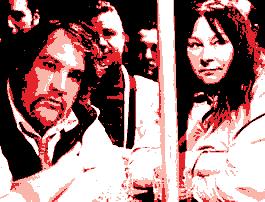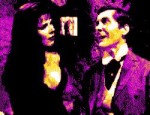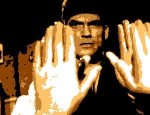Film Review
After first gaining recognition as actors with a particular penchant for
comedy, Gustave Kervern and Benoît Delépine found further acclaim
as film directors with their debut offering, the off-the-wall road-movie
Aaltra (2004). This was followed by an unsettling fantasy offering
Avida (2006) and then their biggest hit to date,
Louise-Michel
(2008). Taking their cue from the Coen brothers, Kervern and Delépine
turn in a deliriously funny anti-capitalist romp that is shot through with
jet black comedy and savage sideswipes at commercial exploitation of the
masses by profit-hungry employers.
Directing a torrent of viciously barbed cynicism towards popular indignation
against unscrupulous bosses, this is just the kind of film that is likely
to go down well in France at the present moment. It came out just in
time - in the wake of the credit crunch - to benefit from widespread public
hostility towards capitalist exploitation.
Louise-Michel
was not only a hit with the public, it was also well-received by the critics
and was awarded the Prix Jacques Prévert du Scénario for its
screenplay in 2009.
As in other Kervern-Delépine offerings, the film makes the most of
its impressive principal cast, with Yolande Moreau and Bouli Lanners making
an extraordinarily entertaining double act as the most unlikely two-person
execution squad in history. The same year, Moreau won acclaim for her
marvellously understated dramatic performance in
Séraphine (2008), but she is
also a superlative comic actress, always at her best when playing colourful
eccentrics in such dangerously unpredictable fare as you'd expect to find
in the Kervern-Delépine stable of oddities.
Here, the ever-delightful Moreau is well-matched with an equally off-beat
comedy performer, the multi-talented Belgian star Bouli Lanners, hilarious
as the hired killer with no talent for killing. Benoît Poelvoorde,
another great actor who is equally adept at drama and comedy, adds further
muscle to a tirelessly executed and brilliantly conceived comedy, with some
other familiar faces - Mathieu Kassovitz, Albert Dupontel - cropping up from
time to time to up the film's stark craziness even further.
A very welcome departure from the slew of crass, predictable mainstream
comedies that have come to dominate French cinema in recent years,
Louise-Michel
is a well-timed burst of full-throttle surreal satire. It is an undoubted
triumph for its writer-directors, who deserve credit for taking one of
the most topical and depressing themes of the time and, by drinking deep
from the well of unfettered weirdness, delivering what is arguably the
most inspired, certainly the most daring, French film comedy of the decade.
© James Travers 2019
The above content is owned by frenchfilms.org and must not be copied.
Film Synopsis
Jobs are increasingly hard to come by in northern France, which is why the
workers at a textiles factory in Picardy become anxious when a nasty rumour
begins to circulate in the town. It seems that the factory's owner
intends closing down his premises and relocating to another region to reduce
his manufacturing costs. To buy himself some time and deflect attention
away from the impending closure, the boss offers his staff a present to show
how much he values them - a shirt embroidered with their first name.
One morning, when the workers turn up for their usual shift they are met
with a grim surprise - the factory gates are locked. It seems the rumours
were true after all. Their inconsiderate boss has done a midnight flit
and left them without a livelihood.
Louise is one of the many women on the payroll who now finds herself without
work and scant chance of finding a new job in a region of exceptionally high
unemployment. Embittered, seething with rage and in no mood for mercy,
she sets about orchestrating a suitably vicious plan of revenge. Pooling
their redundancy money, the women are able to engage the services of a professional
killer, who is now tasked with finding their former employer and murdering
him. The man they choose for this deadly assignment is Michel, a small-time
criminal who has never killed anyone in his life - and shows little aptitude
for doing so. Realising that Michel stands little chance of fulfilling
his contract by himself, Louise decides she must lend him a helping hand...
© James Travers
The above content is owned by frenchfilms.org and must not be copied.



